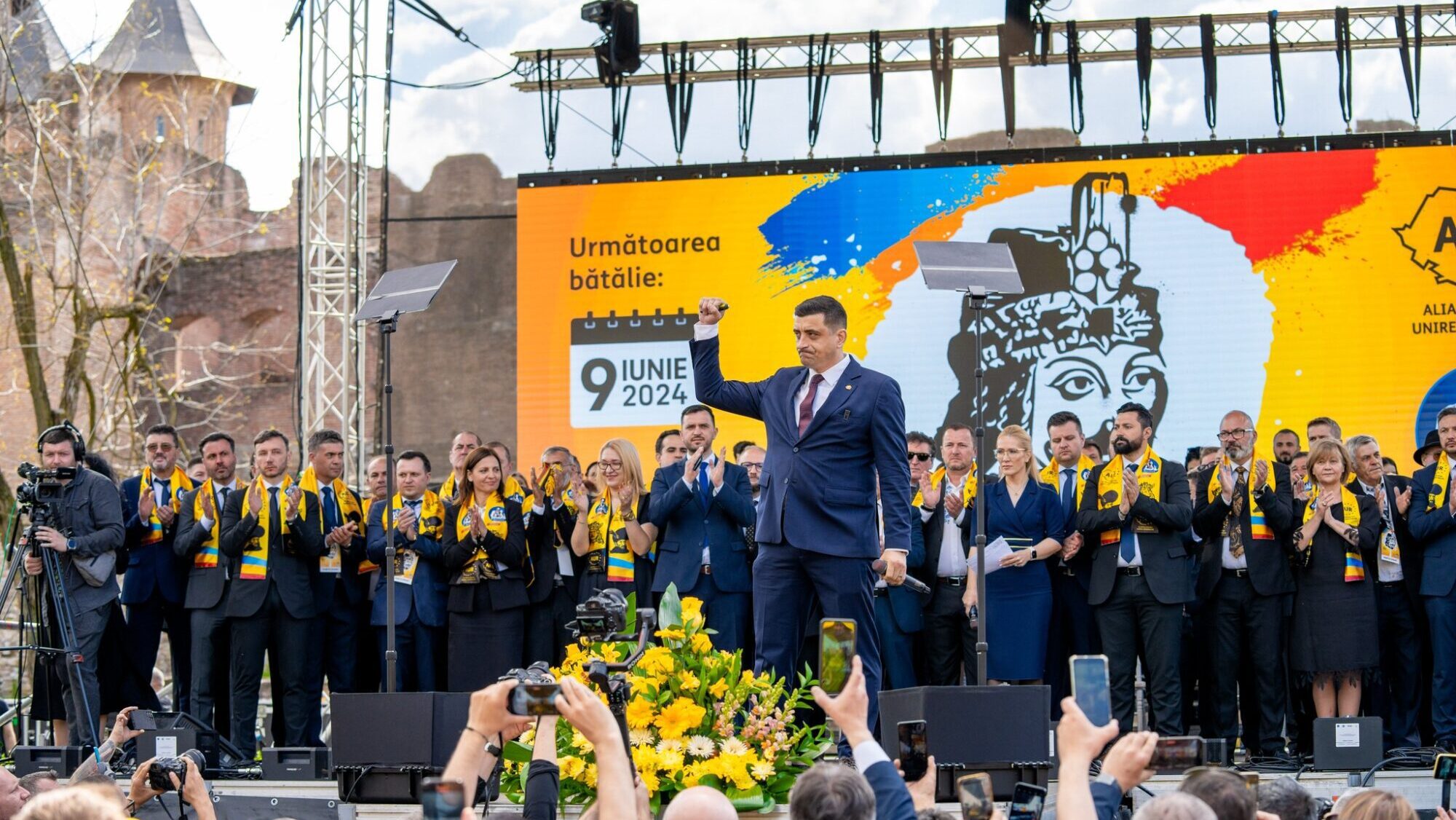
AUR election campaign event, 7 April 2024.
Photo: AUR on Facebook, 8 April, 2024
AUR (Alliance for the Union of Romanians), a rising Romanian nationalist party, is yet again in the center of a political controversy after party leader George Simion called the main party representing the Hungarian community a “hideous, chauvinistic creature.” He then declared it AUR’s number one “political enemy” during a campaign event in the western Transylvanian county of Satu Mare, which has a population of over 35% ethnic Hungarians.
“My message in Satu Mare is that our political enemy in this county and at the national level is a hideous, chauvinistic creature called UDMR,” Simion said in front of a giant banner depicting the medieval Romanian ruler Vlad the Impaler, a/k/a Dracula, the AUR campaign’s official mascot.
AUR is currently polling in third place with 17% behind the social democrat PSD (32%) and the center-right PNL (20%), so one would think it would try to punch upward so close to the election, and not down against a small ethnic party that is no threat to it, with electoral results barely reaching 6%.
Anti-Hungarian rhetoric has always been one of AUR’s main appeals. After entering the Parliament in 2020, AUR’s first proposal was to ban UDMR from public life, branding the Hungarian politicians a band of “ethnic terrorists,” a convenient target for harassment and physical assault for AUR’s nationalist supporters.
AUR has been the subject of other accusations, as well, in its short history. AUR’s top representatives have proudly identified the party as the ideological successor to the interwar period’s fascist Iron Guard party or expressed sympathy for members of its adjacent, hardline antisemitic Legionary Movement—responsible for the death of up to 380,000 Romanian Jews. Accusations of antisemitism led Israel to boycott the party until a 2023 meeting between the country’s envoy to Romania and AUR’s George Simion. According to The Times of Israel, Simion “acknowledged the responsibility of Romania for the Holocaust of the Romanian Jews (in the territories controlled by Romania during World War 2), and expressed his deepest regret.” However, Simion failed to address the Vashem Holocaust center’s demand for an acknowledgment that the country’s Iron Guard “not only collaborated with Nazi Germany but also initiated some of the mass killings.”
Critics of the party have also pointed to AUR’s posture towards neighboring countries, accusing it of working toward the destabilization of the region, especially with regards to Ukraine.
One of AUR’s main political goals is to unite Romania with not only Moldova but all its historical territories, including Southern Bessarabia and Northern Bukovina, both part of today’s Ukraine. In 2023, then-AUR Senator Diana Șoșoacă submitted a (since failed) bill aiming to terminate a 1997 treaty of good neighborliness between Kyiv and Bucharest and to “re-annex” these territories.
“We will only be truly sovereign if we restore the natural borders of the Romanian state,” Claudiu Târziu said earlier this year, repeating his party’s extensive list of territorial claims from Ukraine. “Everything that belongs to the Romanian nation must return to the borders of the state.”
As a consequence, the party’s leader and most controversial figure, George Simion, has been banned from entering both Ukraine and Moldova—not only because of party’s position on this, but also his alleged Russian connections. According to the Ukrainian intelligence agency SBU, Simion has at least once met with Russian special services after the invasion began.
Controversies surrounding AUR may affect its relationships with the party’s future allies in Brussels. Given its likely significant entry into the European Parliament after the elections in June, AUR has been positioning itself to join a right-wing bloc in Brussels. It is no secret that AUR wants to join the European Conservative and Reformist (ECR) group after the elections—and is especially close to Italian PM Giorgia Meloni. However, it would likely be more welcome among the members of the right-wing populist Identity and Democracy (ID) group. Wherever the party ends up, working together with more significant forces on the European sovereigntist Right—of which the Hungarian Fidesz led by PM Viktor Orbán is a central force—may be more difficult for both sides than anticipated.
